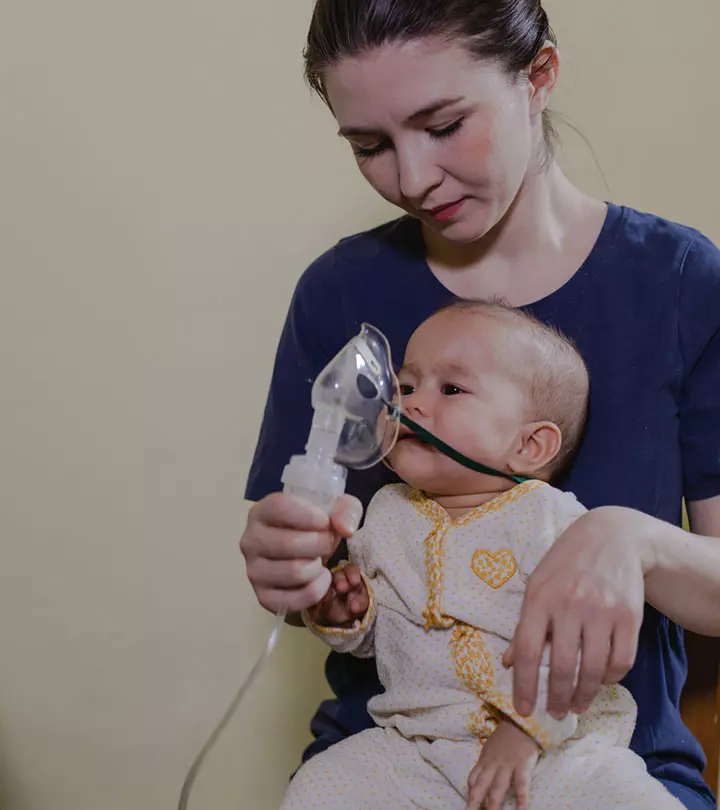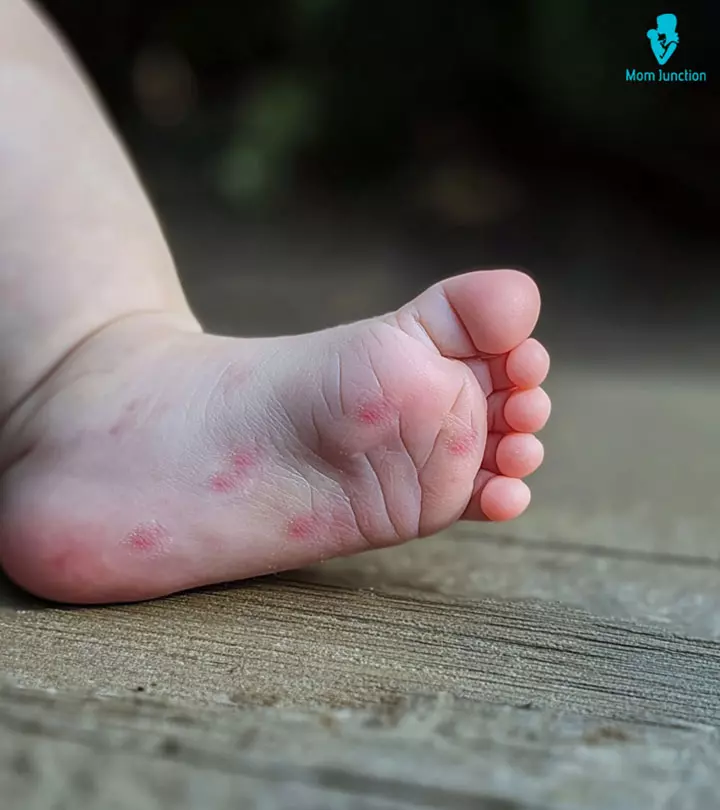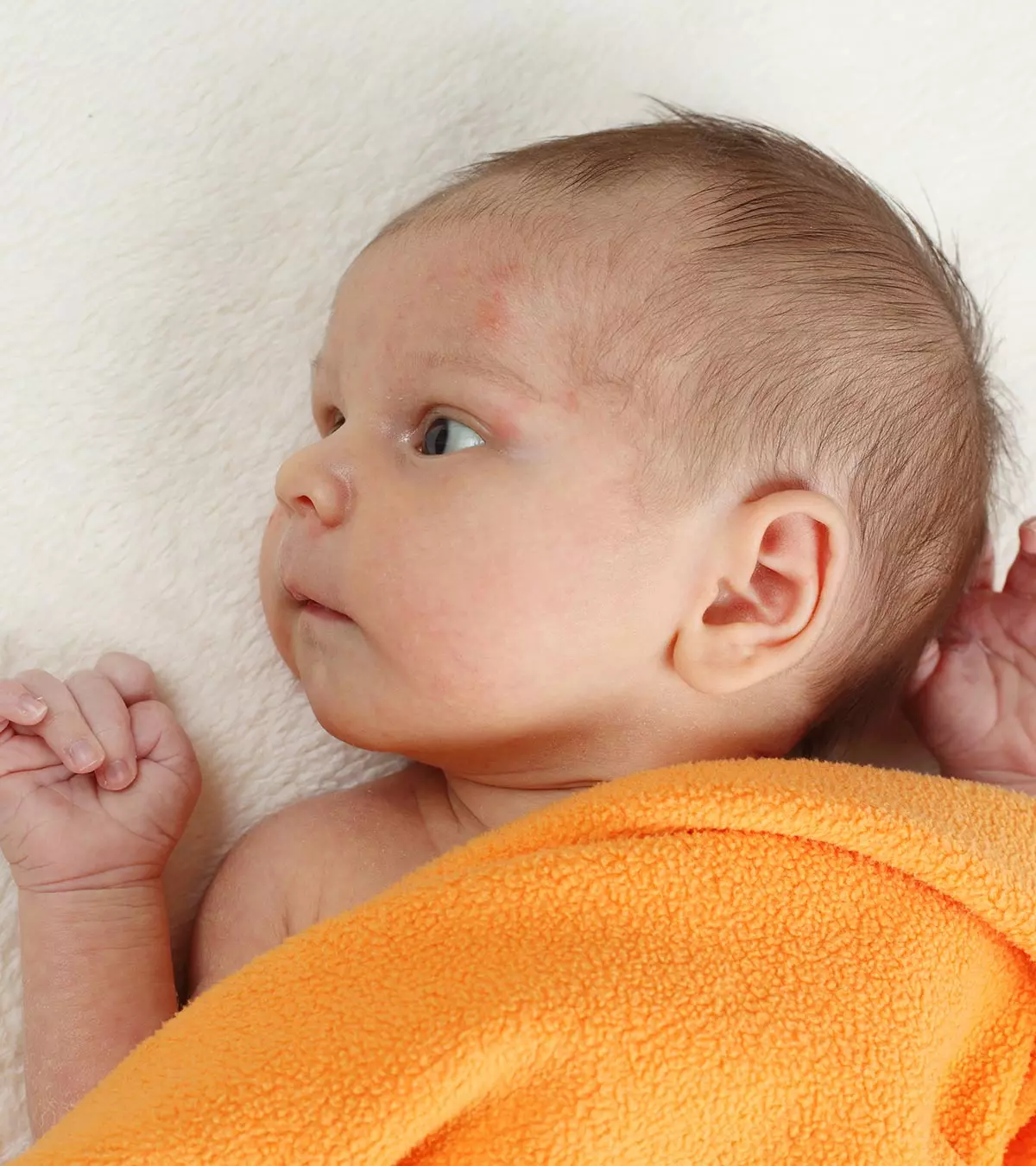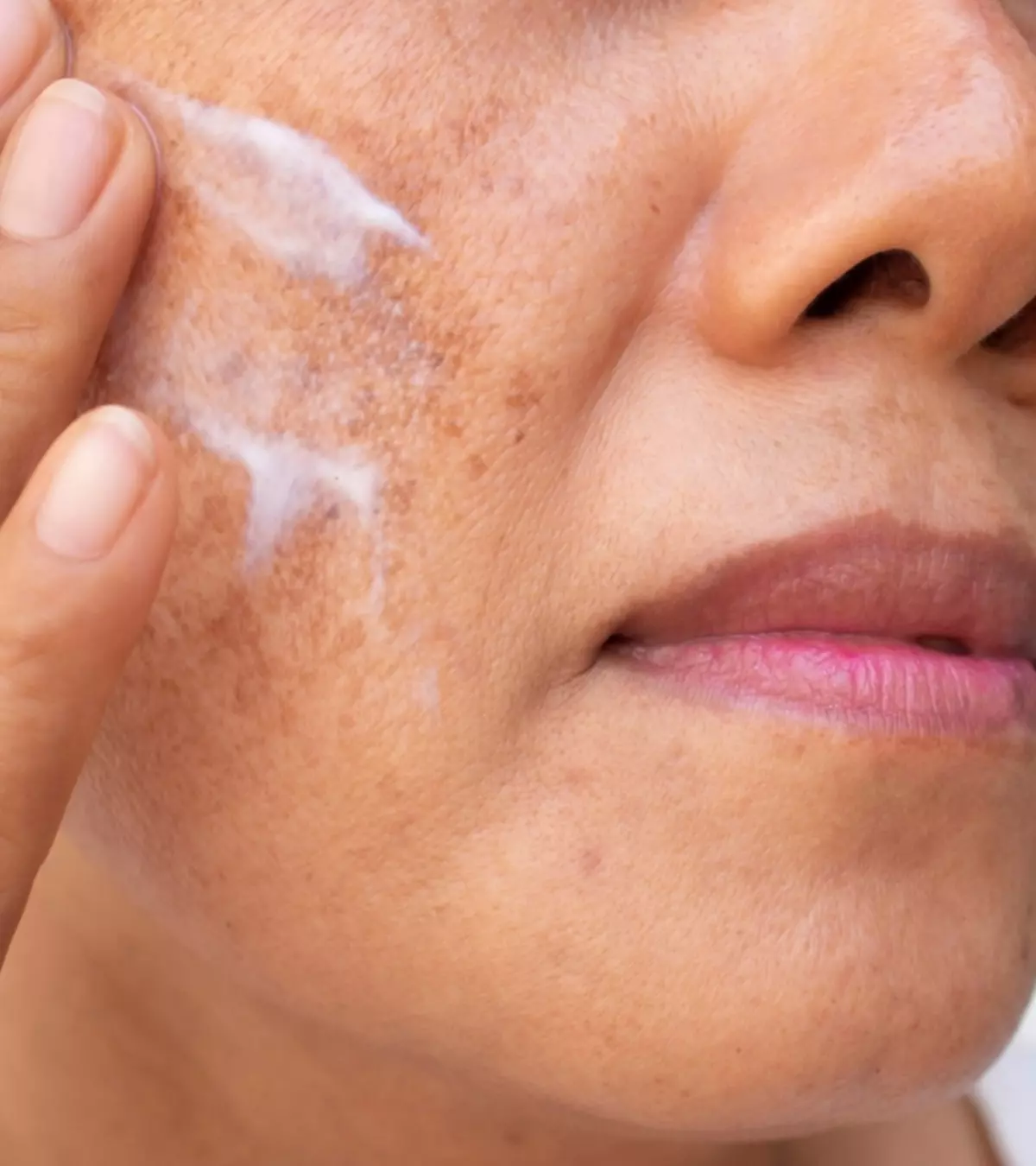
Image: Shutterstock
Eye twitching during pregnancy can be due to benign reasons and usually resolve without treatment. Twitching of the eye occurs as an unpredictable, repeated muscle contraction due to an involuntary spasm of the eye muscle. These eye spasms may repeat every few seconds, and the condition may last for a few minutes to several days or more (1).
Read on to learn the signs, causes, and remedies for eye twitching during pregnancy.
Key Pointers
- Increased blinking, irritation, dryness, and light sensitivity can be associated with eye twitching in pregnancy.
- Eye twitching can be avoided during pregnancy if you take proper care of your eyes, prevent stress and caffeine, and get adequate sleep.
- Treatment for eye twitching varies based on the underlying cause, but symptomatic treatment and proper care can help in most cases.
What Are The Signs Of Eye Twitching In Pregnancy?

Image: Shutterstock
The signs of eye twitch or myokymia during gestation are similar to eye twitching symptoms in a non-pregnant state. Here are some common signs of eye twitching (2) (3).
- Uncontrolled blinking of eyelids
- Irritability in the eyes
- Blurred vision
- Sensitivity to bright lights
- Dryness and tiredness in the eyes
 Point to consider
Point to considerWhat Causes Eye Twitching During Pregnancy?

Image: Shutterstock
Studies suggest that the etiology of eye twitching is not well known. However, most factors that may cause this condition are similar in pregnant and non-pregnant women (1) (4) (5) .
- Increased stress, often due to pregnancy-related hormonal changes
- Fatigue
- Vision changes
- Nutritional deficiencies
- Dryness in the eyes
- Excess caffeine consumption
Some women may experience rapid involuntary eye contractions, resulting in the closure of eyelids.
Eyelid spasm is a severe form of eye twitching and is known as blepharospasm. It requires prompt medical attention (6).
Some women may experience eye twitching with no discernible underlying cause except stress. The stress may be psychological due to pregnancy-related effects and anxiety of having a newborn. For instance, Alyssa, a mother of a toddler, was anxious about potentially having a C-section for her second pregnancy, leading to stress. This, she observed, caused eye twitching. She says, “I am working on and trying to just let go of things that I can’t control, but it really brought on some anxiety, and then after that, my eye started twitching. It was twitching in the corner of my eye, so I googled it. A lot of people say that eye twitching is a symptom of pregnancy, but I also read that eye twitching in pregnancy is a symptom of stress in pregnancy. That really makes sense because I was very stressed and had a lot of anxiety. Ever since I really started to do a better job at coping with my stress and anxiety, my eye has stopped twitching (i).”
 Quick fact
Quick factHow To Manage Eye Twitching In Pregnancy?
Eye twitches can be bothersome, especially if they last for long periods. Usually, it should resolve without treatments. You can try these remedies at home to manage pregnancy eye twitching.
- Get adequate sleep and rest: Research suggests that stress and fatigue can increase the risk of eye fluttering and twitching (4). Therefore, sufficient rest and sleep in pregnancy are important to reduce strain to the eyes and the eye muscles.
- Reduce caffeine intake: Excess caffeine intake may not be good for the fetal health and may also increase the risk of maternal eye twitching (7)(4). Reducing caffeine intake could help avoid eye twitching during pregnancy, and reduces the anemia risk.
- Avoid stress: Stress during pregnancy could increase the severity of ocular twitching. Explore ways to reduce stress to relax your mind and body (6). You may consider a regular exercise routine, simple eye exercises, breathing exercises, and meditation (8).

Image: Shutterstock
- Practice good eye care: Take good care of your eyes by staying hydrated and reducing screen time to keep pregnancy-related eye twitching at bay. You may consult an ophthalmologist who may prescribe you eye drops for lubrication, known as “artificial tears” (9).
 Quick fact
Quick factWhen To Call The Doctor?

Image: Shutterstock
Eye twitching seldom causes any serious problems. Nevertheless, contact your physician or eye doctor if you experience the following symptoms (2) (4).
- Eye spasms or twitching that stays for a week or longer
- Difficulty opening your eyes
- Twitching leads to the closure of one or both eyelids
- Twitching develops in other parts of the face
- Twitching is accompanied by eye redness, swelling, or discharge
- Blurring vision
- See abnormal spots
Are There Any Medications For Eye Twitching In Pregnancy?
Medicines for eye twitching during antenatal or prenatal periods will depend on the underlying cause. Before prescribing medicines, the doctor or ophthalmologist will assess the symptoms and other problems, such as eye redness or swelling.
Those with chronic eye twitching may usually have an underlying neurological problem, such as blepharospasm or Parkinson’s disease. Medications to improve nerve function may be suggested based on the severity of the problem. In rare cases, surgery may be needed to cure blepharospasm.
Chronic eye twitching due to muscle spasms could be treated with botulinum toxin (Botox). The substance could be injected into the affected eyelid muscle, helping it relax and alleviating twitching. Botulinum toxin is safe during pregnancy, with no adverse effects reported in fetus and mother (10).
Here are some of the pregnancy-related eye symptoms and conditions that may indicate an underlying problem.
- Vision changes: A surge in pregnancy hormones may alter the power of your existing eyeglasses or lenses. If you feel a change in your vision, discuss with your doctor, who may suggest if you need a new pair of glasses.
- Blurry vision: Blurred vision and double vision may signify a serious problem, such as preeclampsia in pregnancy. You may also experience spots, flashes, and increased light sensitivity. It is important to recognize these signs and contact your doctor to avoid complications (11).
- Migraine: Throbbing migraine headaches are common in pregnancy and are associated with sensitivity to light and sound (12).

Image: Shutterstock
- Pigmentary changes: Skin pigmentary changes in pregnancy often cause pigmentation on the eyelids’ skin. It is not severe and goes away after pregnancy (13).
- Dry eyes: Hormonal changes may cause dry eyes in pregnancy, causing irritability and making it difficult to wear contact lenses. Your eye doctor may advise artificial tears or lubricating eye drops to reduce the discomfort (14).
- Puffy eyes or eyelids: Puffy eyes or eyelids may cause discomfort and affect vision. Staying hydrated, taking your pregnancy vitamins, and having a diet low in sodium may help reduce water retention and puffiness (11).
Frequently Asked Questions
1. Is twitching during pregnancy normal?
Although not a serious condition, eye twitching is common among pregnant women due to pregnancy-related stress, tiredness, etc.
2. Is eye twitching a vitamin deficiency?
Eye twitching can be caused by lacking essential vitamins, such as vitamin B12. Therefore, take all the vitamin-rich foods and supplements, if necessary (15) (16).
3. Does dehydration cause eye twitching?
Dehydration during pregnancy can cause various complications, including the spasms of the eyelids that can cause eye twitching (16).
4. Can low iron cause eye twitching?
Yes, although not directly, low iron levels can cause eye twitching. Low iron levels in the body cause tiredness (17), which eventually leads to eye twitching.
Eye twitching during pregnancy is mainly caused due to non-concerning reasons and resolves on its own. However, sometimes, along with the twitching of the eyes, if you observe any other symptoms such as blurry vision or discharge from the eyes, or an eye condition that might indicate an underlying problem such as puffy eyelids or dry eyes. In such cases, it is advised that you inform your doctor about it. Taking basic care measures such as getting enough rest and having a balanced diet rich in nutrients and vitamins can help in reducing the risks of complications.
Infographic: Possible Medical Causes For Chronic Eye Twitching
Some women may experience eye twitches for benign reasons when pregnant; however, if the eye twitching seems persistent such that it affects a woman’s vision or routine, there may be an underlying medical reason for it. A few such conditions are discussed in this infographic that may be responsible for chronic eye twitching. Illustration: Momjunction Design Team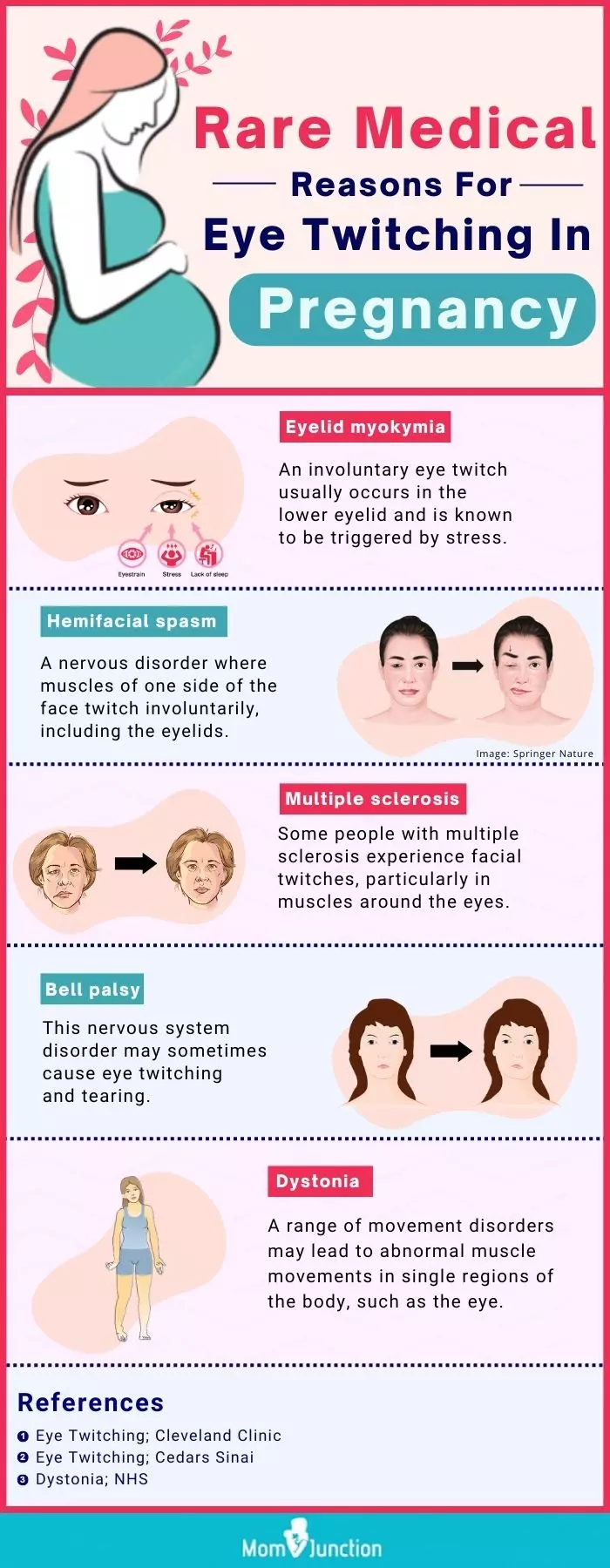
Eye twitching in children may also be due to an unclean eye. Get tips from this video to ensure that the child’s eyes and eyelids stay clear of irritants.
Personal Experience: Source
MomJunction articles include first-hand experiences to provide you with better insights through real-life narratives. Here are the sources of personal accounts referenced in this article.
i. Eye twitching + stress in pregnancy.https://www.youtube.com/watch?feature=shared&v=ss2TCNGnriE
References
- Why You Have That Pesky Eye Twitch — and When to Seek Help.
https://health.clevelandclinic.org/why-you-have-that-pesky-eye-twitch-and-when-to-seek-help - Eyelid twitch.
https://medlineplus.gov/ency/article/000756.htm - Eye Twitching.
https://www.cedars-sinai.org/health-library/diseases-and-conditions/e/eye-twitching.html - Abd Alkader et al. Eyelid Myokymia.
https://www.ncbi.nlm.nih.gov/books/NBK560595/ - Blepharoptosis as a complication of pregnancy.
https://pubmed.ncbi.nlm.nih.gov/6497218/ - Blepharospasm.
https://www.betterhealth.vic.gov.au/health/conditionsandtreatments/blepharospasm - Caffeine.
https://medlineplus.gov/caffeine.html - Eye Twitching.
https://www.hopkinsmedicine.org/health/conditions-and-diseases/eye-twitching - H. Murad and M.A. Nyc Evaluating The Potential Benefits Of Cucumbers For Improved Health And Skin Care.
https://www.jarlife.net/3050-evaluating-the-potential-benefits-of-cucumbers-for-improved-health-and-skin-care.html - Michael Tan et al. Botulinum toxin type A in pregnancy.
https://www.ncbi.nlm.nih.gov/pmc/articles/PMC3828093/ - Pregnancy and Your Vision.
https://preventblindness.org/pregnancy-and-your-vision/ - Peter J Goadsby et al. Migraine in pregnancy.
https://www.ncbi.nlm.nih.gov/pmc/articles/PMC2440903/ - Nursal Melda Yenerel and Raciha Beril Küçümen; Pregnancy and the Eye; Turkish journal of ophthalmology; NCBI
https://www.ncbi.nlm.nih.gov/pmc/articles/PMC5082244/ - How your eyesight changes during pregnancy.
https://www.aop.org.uk/advice-and-support/for-patients/eye-care-blogs/2020/09/17/how-your-eyesight-changes-during-pregnancy - Vitamin B12 Deficiency Overview – Pins and Needles, and loss of power.
http://b12d.org/overview/symptomspns - Eye Twitching During Pregnancy: Causes and Remedies; New Health Advisor
https://www.newhealthadvisor.org/eye-twitching-during-pregnancy.html - Why am I tired – am I iron deficient?; Queensland Government
https://medlineplus.gov/genetics/condition/aceruloplasminemia/
Community Experiences
Join the conversation and become a part of our nurturing community! Share your stories, experiences, and insights to connect with fellow parents.
Read full bio of Dr. Raymundo Canales de la Fuente
Read full bio of Vidya Tadapatri
Read full bio of Rebecca Malachi
Read full bio of Dr. Joyani Das












